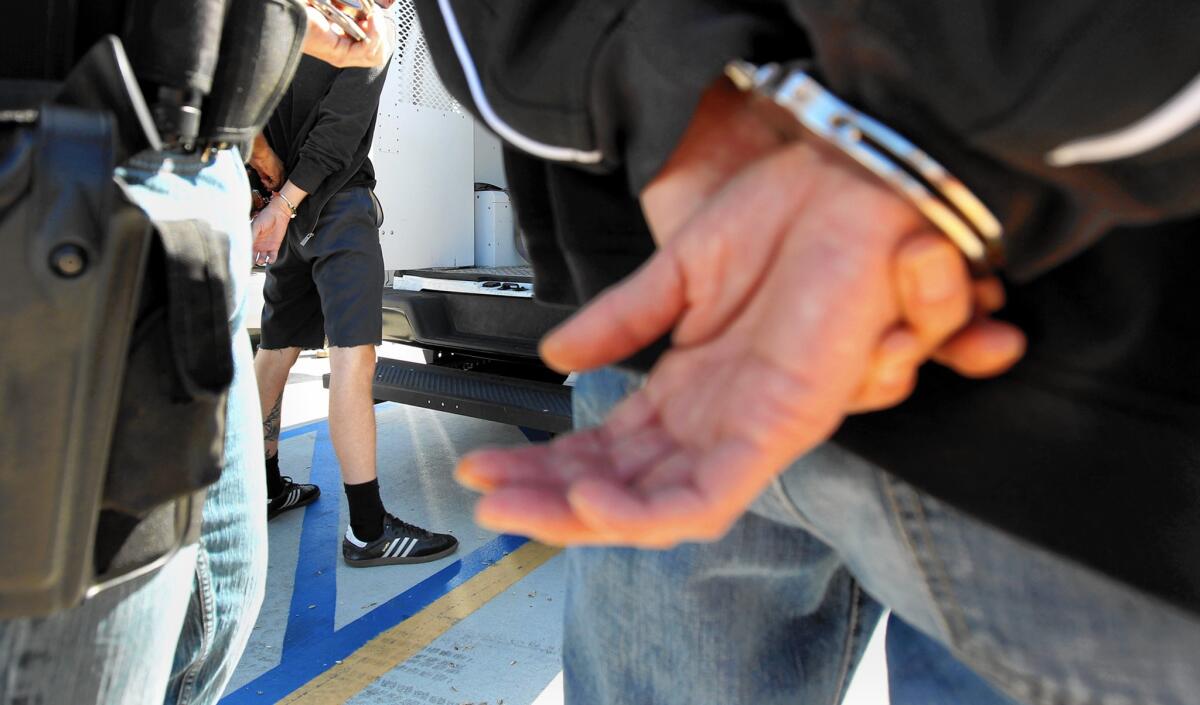California may shield immigrants charged with drug crimes from deportation

When Jesús Cordero was arrested for Ecstasy possession, his lawyer offered what seemed like an obvious solution: Plead guilty and undergo drug counseling. Once Cordero completed the course, the charges would be dismissed.
It’s a popular option for Californians charged with minor drug crimes who seek to avoid jail time and clear their records. But for immigrants such as Cordero, who was then living in the United States illegally, such a plea can trigger their deportation.
Now, in a state that has both liberalized immigration laws and eased punishments for drug crimes, legislators will soon consider a measure that could shield immigrants from such consequences.
The proposal addresses a difference between state and federal law. Although California considers minor drug charges to be wiped away once a defendant finishes treatment, nearly all drug convictions still stand under federal immigration law — and can set off deportation proceedings. That applies to immigrants without legal papers and those with green cards.
“There has been this real gap between California’s law and federal policy that has created serious consequences for people,” said Angie Junck, an attorney with the Immigrant Legal Resources Center, a proponent of the new measure.
Under the new proposal, people charged with drug possession and other low-level narcotics crimes could opt for treatment before entering a plea. If they completed their courses, they would not have to enter a guilty plea. If they failed, they would face criminal proceedings.
The option would not be available for people with a history of drug sales or any violent or other serious felony.
The bill’s author, Assemblywoman Susan Talamantes Eggman (D-Stockton), said such a change would make it possible for immigrants to choose drug counseling without risking deportation.
“For those who want to get treatment and get their life right, we should see that with open arms, not see it as a way of deporting somebody,” she said.
The advocacy group Human Rights Watch, citing Department of Homeland Security data, said more than 500,000 people nationwide were deported between 1997 to 2012 with a drug offense as their most serious conviction.
That group and other backers of Eggman’s measure are hoping to take advantage of California’s increasingly immigrant-friendly Legislature and the state’s tilt toward milder drug penalties, including last year’s passage of Proposition 47, which reduced drug possession crimes from potential felonies to misdemeanors.
But proponents of the strict enforcement of immigration laws said the bill caters to those living here illegally at the expense of public safety.
“I’m always a little bit astonished at the length that certain advocacy groups will go to try to protect noncitizens from deportation when they’ve been involved in criminal activity,” said Jessica Vaughan, of the Center for Immigration Studies.
“What is the public interest for the state of California to allow illegal alien drug offenders to walk away from prosecution and deportation?” she said.
The bill also faces resistance from some in law enforcement.
Sean Hoffman, a lobbyist for the California District Attorneys Assn., said allowing people to enter drug treatment before entering a plea generally “ends up being more labor intensive for prosecutors. … If the defendant fails [in treatment], we’re left trying to track down witnesses and evidence” months after the crime occurred.
Hoffman said his group was sympathetic to the concerns of advocates for immigrants. But he added, “We think that there’s another way to address that problem without upending the existing process.”
Supporters of Eggman’s bill, AB 1351, say Cordero’s story shows that the system has flaws.
Born in Mexico, Cordero moved to Redwood City as a young boy with his family and lived there without legal papers for nearly 15 years. He married his teenage sweetheart, a U.S. citizen, at 21 and was well into the application process for legal residency when he was caught in 2011 with three Ecstasy pills.
Cordero said he valued the drug education classes. “If it wasn’t for this, I’d probably be in a worse situation,” he said. “Maybe I would’ve kept on using drugs.”
He said his public defender did not warn him that a guilty plea could put him on federal immigration officials’ radar.
Cordero’s plea upended his green card application, and the threat of deportation loomed. After spending thousands of dollars on attorneys, Cordero eventually had his drug charge vacated, meaning he would suffer no immigration consequences.
He has since obtained a green card. But he said the ordeal took years.
“It’s not fair for people to have to go through all this because of a really stupid mistake,” Cordero said. “There should be a change.”
melanie.mason@latimes.com
Twitter: @melmason
More to Read
Start your day right
Sign up for Essential California for news, features and recommendations from the L.A. Times and beyond in your inbox six days a week.
You may occasionally receive promotional content from the Los Angeles Times.







